Write the ideal farmer resume with this quick guide
This resume guide focuses on teaching farmers how to create the ideal resume for a farming position. Topics covered include resume formatting, resume summaries, resume skills, writing the work experience section, and properly listing education.
As a farmer, you have extensive experience in a variety of roles, from agriculture and crop growing to livestock care and machinery operation. When writing a resume as a farmer, it is essential to highlight your many areas of expertise and establish your greatest professional strengths.
In this guide, we will discuss how to optimize each section of your resume as a farmer to help you land the job of your dreams. Keep reading to learn:
- What resume format best suits the needs of a farmer
- How to write a resume summary as a farmer
- Which key skills to include on a farmer’s resume
- How to prioritize your accomplishments in your work experience section
- How to list your educational credentials as a farmer
1. What resume format best suits the needs of a farmer?
In general, a farmer should strive to use a reverse-chronological format when writing their resume.
Reverse-chronological resumes focus primarily on work experience, making this section the most prominent in the document. This format is best suited for farmers, as employers will be most interested in your previous work history and the experience you have to offer.
However, if you are new to the industry or are changing career paths within the industry, there are alternative options that may better suit your needs. These include:
Functional resumes: The functional resume focuses on education and skills over work experience. This format is commonly used by applicants who lack relevant work experience and have recently graduated from a degree or certification program. The functional resume is often used by farmworkers who are still seeking entry-level positions, rather than higher-level management positions.
Hybrid resumes: The hybrid resume combines elements of both the reverse-chronological and functional resumes. It is well-suited for applicants who have relevant experience, but perhaps not enough to fill an entire resume. This format is often used by those with large gaps in their work history or those who are shifting from one career path to another (i.e. a farming accountant who has chosen to pursue farm management instead).
2. How to write a resume summary as a farmer
As a farmer, your resume summary helps introduce you to an employer with a brief overview of your professional strengths and goals. If you are higher in the farming hierarchy, such as at the management level, it is often to your benefit to focus on your professional objectives within this summary as well.
Below, we have provided two examples of resume summaries belonging to farmer applicants, with one that is weak followed by a corrected version.
Incorrect farmer resume summary example:
Farmer with a decade’s experience working in agriculture and horticulture. Responsible for large teams of workers, as well as serving as the direct connection to customers. Interested in advancing to a management position.
What's wrong with this example? This resume summary lacks specificity and is overall rather dull. You want your summary to be eye-catching to hook the attention of the reader. Additionally, the details you include should have as much quantifiable contextualization as possible (i.e. specific numbers, years of experience, etc.)
Corrected farmer resume summary example:
Associate Farm Manager seeking advancement to a Lead Farm Manager position. Over 11 years of experience working in fields, managing crops, directing crews of 20+ members, and implementing horticulture systems. Highly experienced in customer relationships and establishing new customer agreements.
Why is this better? In this example, the applicant clearly states their intention to move up within the industry, as well as providing much more specific details regarding their experience and qualifications. They address both their technical and interpersonal strengths, making this resume summary much more impressive to potential employers.
3. Which key skills should you include on a farmer’s resume?
Being a farmer requires you to not only manage the many moving parts of a farm, but to also direct workers, communicate with customers, and much more. As such, your resume should highlight your full spectrum of skills, including both technical and interpersonal abilities.
Here are several excellent examples of both technical and interpersonal skills that look great on a farmer’s resume:
- Machinery operation and maintenance
- Heavy lifting, physical strength, and stamina
- Hiring and training farmworkers
- Livestock care and management
- Crop maintenance
- Irrigation systems
- Order fulfillment for customers and buyers
- Knowledge of USDA safety standards
- Proper storage of chemicals
- Interpersonal & Communication Skills
- Leadership
- Mentorship
- Time management
- Delegation
- Multi-tasking
- Collaboration
4. How to prioritize your accomplishments in your work experience section
As you write your work experience section on a farmer’s resume, it is highly important to think about which details are going to be the most eye-catching and impressive to employers. Providing quantifiable and specific data points is an excellent way to not only showcase your accomplishments but also emphasize your effectiveness within the position.
Here is an example of a work experience entry from a farmer’s resume:
Farm Manager | Hideaway Farms, Inc.
Glendale Springs, NC | June 2014 to March 2020
- Hired, trained, and managed a farmhand staff of more than 50+ employees.
- Collaborated with independent and commercial buyers to place and fulfill orders of produce and livestock.
- Implemented a new irrigation system that increased crop yield by 10% and reduced water usage by more than 20%.
5. How to list your educational credentials as a farmer
Listing your education and certifications properly on your resume as a farmer is crucial. There is no one precise path to becoming a farmer – however, there are certain educational credentials and certifications required to move up within the farming hierarchy.
When listing these details, make sure to include your highest level of education, along with any relevant and unexpired certifications you have earned.
Here is an example of a well-crafted education section on a farmer resume:
Education
B.S. in Agricultural Business | The University of Tennessee
- Double Major: Farm and Ranch Studies & Agribusiness
- Graduated: 2016
- GPA: 3.9
Certifications
- Accredited Farm Manager | American Society of Farm Managers & Rural Appraisers
- Certified Landscape Water Manager | Irrigation Association

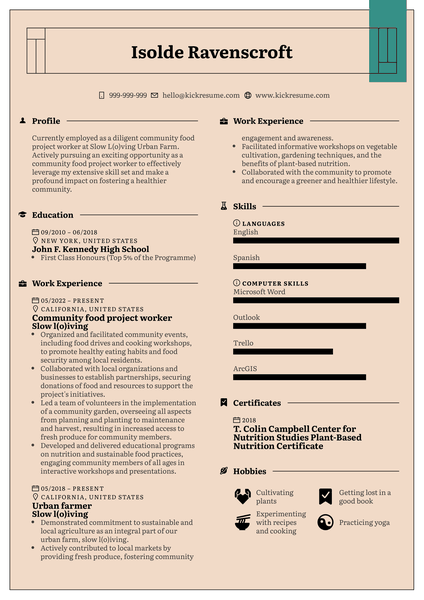
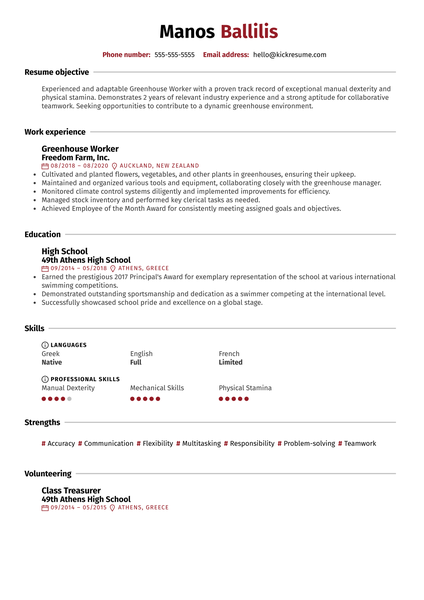
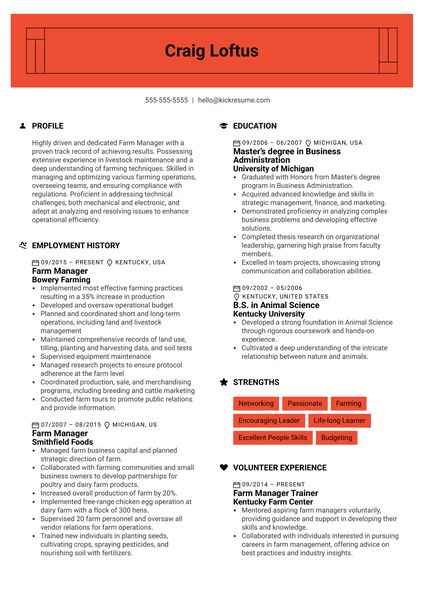
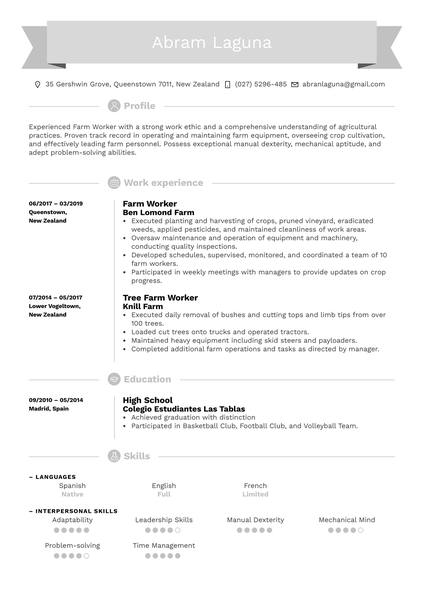

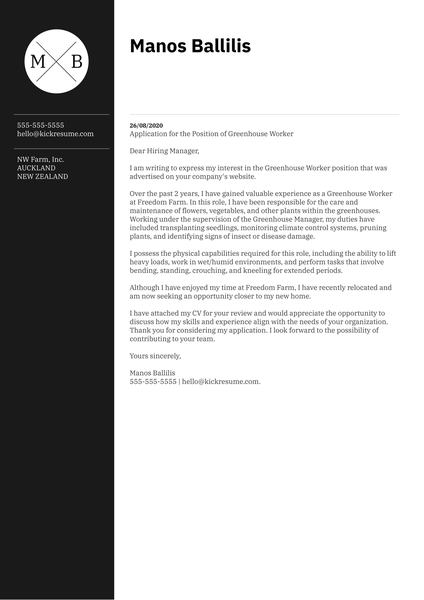
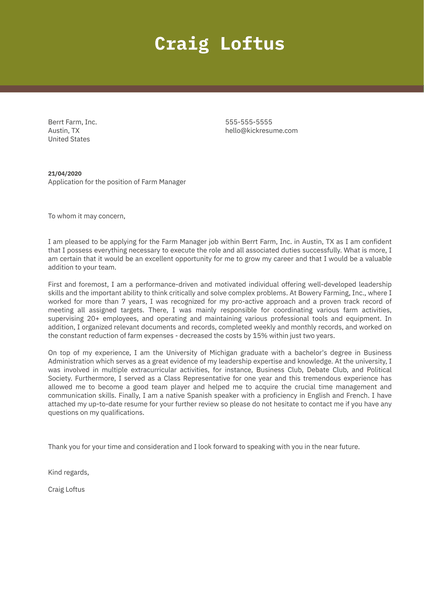
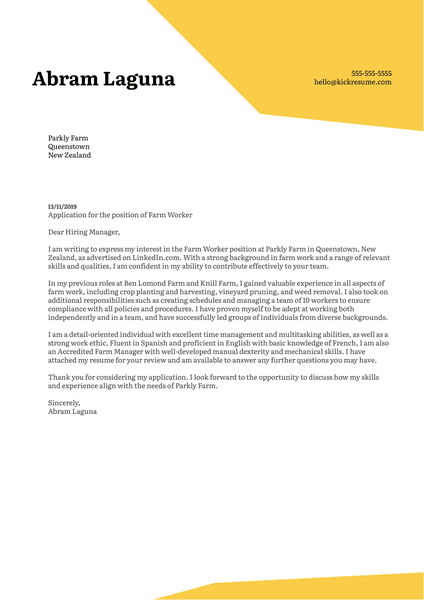
![How to Write a Professional Resume Summary? [+Examples]](https://d2xe0iugdha6pz.cloudfront.net/article-small-images/i-Profile.svg)
![How to Put Your Education on a Resume? [+Examples]](https://d2xe0iugdha6pz.cloudfront.net/article-small-images/i-Collage-Universities.svg)
![How to Describe Your Work Experience on a Resume? [+Examples]](https://d2xe0iugdha6pz.cloudfront.net/article-small-images/Experience.svg)


